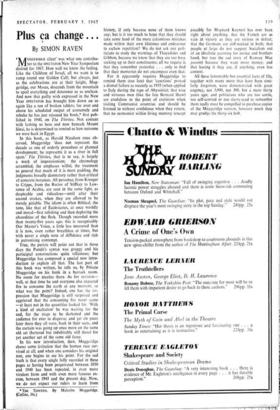Plus ca change ...
By SIMON RAVEN
MUGGERIDGE silent' was what one contribu- tor to the SPECTATOR New Year Symposium desired for 1967. How well we know the feeling.
Like the Children of Israel, all we want is to romp round our Golden Calf; but always, just as the celebrations are at their height, Mug- geridge, our Moses, descends from the mountain to spoil everything and denounce us as unclean. And now that guilty wish expressed in the New
Year SPECTATOR has brought him down on us
again like a ton of broken tablets; for over and above his scheduled output of contumely and
rebuke he has just reissued his book,* first pub- lished in 1940, on The Thirties. Not content with lashing us here and now beneath Mount Sinai, he is determined to remind us how noisome we were back in Egypt.
In this book, as Harold Nicolson once ob- served, Muggeridge 'does not represent the decade as one of orderly procedure or planned development; he represents it as a river in full spate.' The Thirties, that is to say, is largely a work of impressionism; the chronology scrambled, the emphases wilful, the treatment so general that much of it is mere padding, the judgments broadly damnatory rather than critical of concrete instances. All personae, from Kreuger to Cripps, from the Rector of Stiffkey to Law- rence of Arabia, are seen in the same light, as despicable and ridiculous—until after their second strokes, when they are allowed to be merely pitiable. The idiom is often Biblical, the tone, like that of Ecclesiastes, at once worldly and moral—first relishing and then deploring the absurdities of the flesh. Though recorded more than twenty-five years ago, this is recognisably Our Master's Voice, a little less measured than it is now, even rather breathless at times, but with never a single note of diffidence and rich in patronising contempt.
True, the purists will point out that in those days the Pundit's syntax was groggy and his participial constructions quite villainous; but Muggeridge has composed a special new intro- duction to explain all that. The last part of this book was written, he tells us, by Private Muggeridge on his bunk in a barrack room. No room for niceties there. As for revision— well, at that time he and everyone else expected fire to consume the earth at any moment, so what was the point? Indeed, one has the im- pression that Muggeridge is still surprised and aggrieved that the consuming fire never came —at least not in the quantities looked for. With a kind of exaltation' he was waiting for the end, for the stage to be darkened and the audience for ever to disperse; and yet six years later there they all were, back in their seats, and the curtain was going up once more on the same old set (battered but indubitably still there) for yet another act of the same old farce.
In his new introduction, then, Muggeridge shows some irritation that the human race sur- vived at all; and when one considers his original text, one begins to see his point. For• the sad truth is that every single folly recorded in these pages as having been perpetrated between 1930 and 1940 has been repeated, in even more virulent form and with even more fatuous ex- cuae, between 1945 and the present day. Now, . we: do not expect our rulers to learn from
• TEE 'DIRTIES. By Malcolm Muggcridge. (Collin' s, 36s.)
history, if only because none of them knows any; but is it too much to hope that they should take some heed of the more calamitous mistakes made within their own lifetimes and endeavour to eschew repetition? We do not ask our poli- ticians to study the warnings of Thucydides and Gibbon, because we know that they are too busy sucking up to_their constituents; all we require is that they remember yesterday . . . only to find that their memories do not encompass even that.
For it apparently requires Muggeridge to remind them (too late) that 'sanctions' proved a dismal failure as recently as 1935 (when applied to Italy during the rape of Abyssinia); that wise and virtuous men (like the late Bernard Shaw) are credulous to the point of cretinism when visiting Communist countries and should be listened to without confidence when they return; that no economist within living memory (except
possibly for Maynard Keynes) has ever been right about anything; that the French are as vain in victory as they are vicious in defeat; that the Germans are stiff-necked in both; that people at large do not support Socialism out of an idealistic yearning for justice and brother- hood, but (see the sad story of Ramsay Mac passim) because they want more money; and that having it they are, if anything, even less content.
All these lamentable but essential facts of life, together with many more that have been simi- larly forgotten, were demonstrated with great cogency, not 3,000, not 300, but a mere thirty years ago; and politicians who are too senile, too self-centred or too starry-eyed to remember them really must be compelled to purchase copies of the Muggeridge version, however much they may grudge the thirty-six bob.






























 Previous page
Previous page